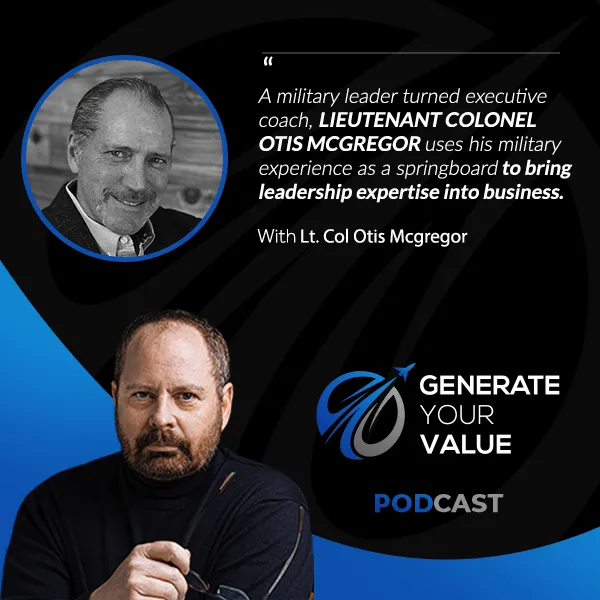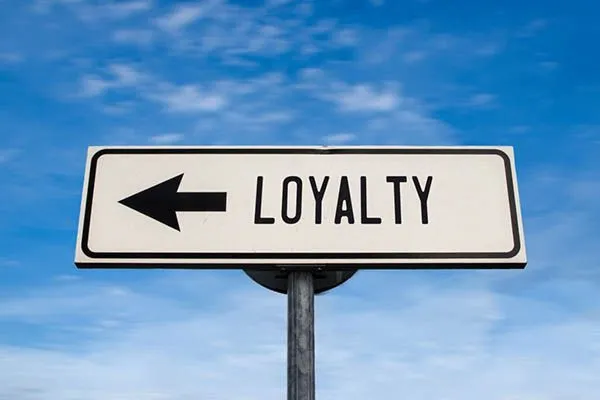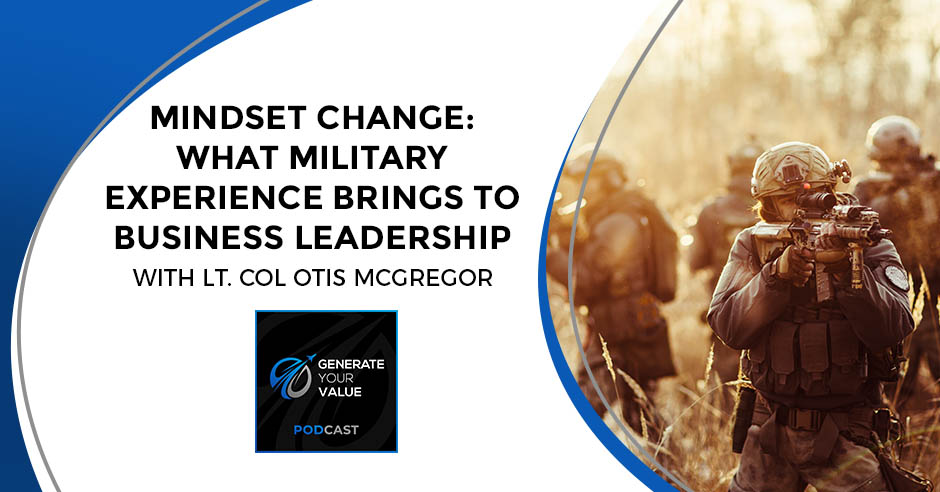Do you want to learn more about what it means to be a leader? Are you wondering how you might use your own experiences in the business world as an advantage? Then this episode is for you. Today, Otis McGregor, CEO of Tribe and Purpose and Retired Lieutenant Colonel, shares the lessons he learned from his military experience that have helped him make his company successful. He tells us about how he was able to use these lessons to grow his business and develop his leadership skills, and how he uses those same principles in his personal life as well. He talks about what the military does for you, how it makes you a better leader, and why you should know that, especially if you are going into the business world. Tune in now and learn how your unique experiences can become great assets to your business!
LISTEN TO THE PODCAST HERE
Mindset Change: What Military Experience Brings To Business Leadership With Lt. Col Otis McGregor
MINDSET CHANGE IS REQUIRED FOR SUCCESS IN TRANSITIONING TO THE BUSINESS WORLD OUT OF THE MILITARY
I’m glad you’re joining us. With us, as always, is Andy McDowell. Andy, it’s good to see you.
It’s good to see you. I’m a little sick of all the rain. This winter in Atlanta doesn’t help me and my puppy dogs out. I’m ready for spring. It’s good to see you, Zach. I’ve been looking forward to this conversation. We’re bringing in family. I say family because he’s a bourbon-drinking and cigar-smoking leader in life and his career. We will get to his bio.
He’s a kindred spirit.
When you say there are people in this world you want to do life with and you want to hang out all the time, this is the guy, at least for Zach and me. Hopefully, you will feel the same way after our conversation. As I said in Dean Wegner’s episode we did at beginning of the season, it’s home and apple pie. This is what America is made out of. You want to hang out and have fun, joy, and happiness sitting on the back porch with your glass of bourbon. This is what life is all about.
Let me bring in our guest. He’s a retired lieutenant colonel with the Green Berets in the Army. His name is Otis McGregor. He owns an executive coaching business. I’m going to give you the roles that he has had in his life. We will let him finally come in and say hi. He’s a leadership expert, an author, a speaker, a podcast host with his son, a project management trainer, a rugby coach, and a retired Lieutenant Colonel of Special Forces Green Beret for the US Army. Zach is standing up ready to salute. Otis, welcome to the show. We’re so happy that you’re here with us.

I’m glad this day finally showed up. When did we plan this?
That’s how far out we sometimes plan our episodes trying to get people lined up but particularly people’s schedules. You want to throw it out there far enough that they could plan around the recording, and it works out for everybody. The universe finally said, “It’s time to do this.” Welcome to the show. Typically, I like to start with people giving the Reader’s Digest of the life story, but for you, I want to pull it out as we go through the conversation. What made you decide to go into executive coaching after you retired from the military? Let’s start there.
Interestingly enough, when you say the family connection, that’s another connection that you and I have. When I retired from the Army, I went into the corporate world. The irony is I was a strategic planner planning all those ops that you read and hear about. In the last 7 or almost 10 years of my career, that was what I did. I was no longer an action guy. I was a planner. When I decided to retire, my only plan was to get a job. I find that every time I think about that and talk about that, the irony does not escape me because what happened when I did that is I went and got a job. I went into defense contracting. It set me on this path that I refer to as wandering the job desert for the next seven years.
I bounced from company to company. Every one of those companies with the full intent of my heart and mind was what I was going to do for the next twenty years. I thought it would be like the Army, “I’ll do this for twenty years and then retire.” They’re all great companies. There was no ding on any of these companies. At the 90-day mark, I started to get this pit in my stomach, “What am I doing? Why am I here? This doesn’t feel right.” I quit every one of those companies. I ended up leaving them in some form or fashion. I had the best job that I could have asked for since retiring from the Army. I was working for a friend of mine. He is the founder of the business.
The business is headquartered in my hometown of Fort Worth. Even going back to the business or the headquarters, I was going back home to see mom and dad, the in-laws, some of my high school buddies, and all those things. That should have been great. I was as frustrated and miserable in that job as I was in every other job. He created the position to hire me. I was still frustrated in that job. On a summer afternoon, I was sitting here in my home office, feeling sorry for myself, and wondering who I am and what was wrong with me. I was in that mode of, “What’s wrong with me?” You look around and see that everybody else has these great jobs and is happy.
You’re the common element in the story.
I was like, “There’s something wrong up here. There’s something wrong with me.” On that summer afternoon, I started to reflect on my life since leaving the Army and realized that only two things have been consistent in my life since leaving the Army. It’s my family and rugby. I started coaching boys in high school rugby right after I left the Army. At the level, I was coaching at and the way I do things, it’s either all or nothing. It was a second full-time job.
I even turned down other higher-paying job opportunities with more responsibility and all those things you searched for in the path of growth and business. I turned those down because they didn’t afford me the flexibility to continue to coach rugby. On that summer afternoon, as I thought about that, I was like, “Why was I so dedicated to this game that I never played growing up? What was it?”
I looked at it and broke it into three components. The first one is the game of rugby. I’ve become a huge fan. I love the strategy, the teamwork, the physical effort, and all those things about the game. That was number one. Number two was the boys. Our club was a club not associated with the high school, which meant our house was the clubhouse. That meant my wife and I had 35 extra sons in and out of our house. Some of those boys still have keys to the front door, to tell you truth. What I realized was the third piece of that. The coaching or being their coach was what was fueling me.
It’s challenging them, holding them accountable, teaching, mentoring, and guiding them to be not just good rugby players but good young men going off and being successful in life. When I realized that, I started talking to some friends about that in my inner circle. I got introduced to this thing called executive coaching and business coaching. I never heard of either one of them at that time. That’s when I shifted gears and changed my trajectory to pivot my consulting company into an executive strategist and coaching company. I’ve been running with it ever since.
What do you think the military experience brings to that leadership and executive coaching in the normal track that most people take that corporate and business experience doesn’t?
There are a couple of things. First off, here’s one of the great things the military is focused on, and this is all branches of service. They each do it a little differently. There’s a whole other show to talk about how each of them does it differently and the influences of that. It’s the leadership trajectory. The military is linear in its development.
It’s also set forth in the fact, “Before we promote you and before we move you to this job, we’re going to send you to school, educate you how to do it, and teach you how to be the next-level leader.” The military is very good about that. In the Army and Marine Corps, it’s huge. The Air Force is pretty good. The Navy has a different system. I’m not docking the Navy. Their system is not quite as linear as the Army and the Marine Corps, but that right there is huge.
The other thing that I say is problem-solving and handling chaos. In my career and the things that I saw, experienced, and dealt with in combat, training exercises, and various schools that I went to, being able to see the chaos, watch the chaos happen and analyze the solution to not allow the chaos to cause panic in who I am and the decisions I make as a leader is a huge skill that the military teaches everybody from the clerks and the cooks to the Green Berets that are out on the fleshy tip of the spear. It’s how to handle chaotic situations and make sure that you can come up with the best solution.
The benefit that companies get when they hire veterans into their teams is huge. It’s one of those underlying things because it’s not a quantifiable check or something that’s put on the resume but when a guy has been through this chaos from somebody shooting at them, bombs going off, mortars, and all those things and has made it through that, then when things fall apart on the shop floor, a shipment is late, or your account’s receivable is starting to look a little crazy and you’re starting to sweat making payroll and all that stuff, the military guy doesn’t freak out. He’s like, “At least nobody is shooting at me.”
It’s a problem to solve. It elicits the scene from Apocalypse Now. The colonel general steps off the helicopter. Helicopters are everywhere. Bombs are dropping everywhere. He’s strutting out there and going, “I love to smell napalm in the morning.”
It smells like victory. This war is going to end.
I don’t care if chaos is going on around me. It’s about analyzing and understanding what’s going on and putting together the best tactic and strategy. You need to be dealing with that present moment. It’s going to be different in 30 minutes but that’s okay.
If chaos is going around you, it’s about analyzing and understanding what’s going on and putting together the best tactic.
I love that scene. It’s a great example. It’s a little crazy. That’s Robert Duvall’s character but when he steps off that helicopter and he’s walking into this area, mortar rounds are coming. It is still a hot LZ, to use the Vietnam term. Guys are diving for cover. He’s standing there and pointing and telling people what to do and how to do it because he is remaining calm in the chaos of the situation. What that calmness does is filter down to the team.
Even in that scene in that movie, watch those men around him. The director does a great job of creating that when you watch the reaction of those men to Duvall’s character walking in calmly. Everything was blowing up around him in these big streams of water from the mortar rounds. You hear the machine guns going off. He is just pointing and telling guys what to do in a nice and calm manner, not in panic.
30 to 60 seconds later, he is talking about the waves and how could they be for surfing. It’s unrelated to what’s going on around him.
One of the things for my up-and-coming leaders is to be a thermostat instead of a thermometer.
Your attitude and how you show up as a leader influences how your team shows up. One of the things that I talk to all my clients about when we talk about energy levels and self-awareness is that like-energy attracts. If I’m stressed and panicked, my team and the people around me that I’m leading feel that stress and panic, whereas if I come in with confidence in myself and a belief that we can solve the problem, we can go forward with the best solution. I have that confidence in us. I can create an optimistic vision because all leaders have to have optimism.
How you show up as a leader influences how your team shows up.
My team is going to believe that because I’m going to sell it to them as opposed to, “The business is folding. We’re $500,000 behind on this. The lease is due and payroll.” You’re a leader and you feel that. Go into your office and close the door. Maybe get a pillow, scream into your pillow, get it out, take some breaths, pull up your calm app, meditate for a moment, chill, get back in control, and then step back out in front of your team. I’m not saying don’t let your team see you stressed, but when they see the stress, they’re like rats jumping off a sinking ship, “I’m out of here.”
In my Boeing days, most of the people that I hired for my team were coming out of the military, having retired with air traffic control backgrounds. They’re mostly Air Force, a little Navy, and a little Army. My biggest conversations with them when I was looking to hire them were centered around this. Your main focus in the military was the enemy. The enemy was the customer. You were raining down on the customer.
Your paycheck was being paid by the taxpayers to keep them safe but now your role is changing. The paycheck is coming from the customer. If you were being mean to your customer in the military, you can’t be mean to your customer here. You have to understand that you’re generating value through your product and service to the customer. We want to keep the customer around. We don’t want them to go away.
You’re almost having to do a 180 flip here from a mindset perspective that A) Your paycheck is not guaranteed by the taxpayers. B) It’s the customer that’s paying your paycheck. We’re here to be a partner and a teammate with the customer as opposed to reigning bombs, mortars, and so forth on top of your customer. That was what I felt was one of the hardest pieces of their transition. I was trying to already start working on that mindset when we were in the interview process but what do you feel are the hardest areas for those transitioning out of the military to come into the business world or civilian?
There are a couple of things. One of my give-backs is coaching guys that are taking their uniforms off so that they have the plan to create their next adventure in life. Part of the problem as I mentioned earlier on the leadership thing is how the military is extremely linear in that. You don’t go from being an E-4 to a four-star general without crossing every single thing in between. Outside the military, that doesn’t exist. Everything is non-linear. That’s one of the big lessons I teach them. Life becomes non-linear outside the military. In the business world, everything is non-linear. That’s number one.
Number two, you don’t have to go to a school to be able to do it. Number three is the hardest one. All those skills that you have, understanding plans, handling chaos, leading in dire straits, and leading in happy and easygoing times, you have to apply to yourself. Every military man that I’ve talked to is so used to being in a team environment, doing everything for the team, and sacrificing their life.
When a soldier dives on a grenade, you see something like that, or runs into gunfire and drags a buddy out, he’s not doing it because he raised his hand to support and defend the constitution. He’s doing it because he cares about the man to his left and right more than he cares about himself. When you take the uniform off, that’s gone. I have to teach them about that because I learned the hard way too. Loyalty is only going to go as far as the dollar goes. You can’t go in there to Acme Brick with this extreme loyalty in giving and expect that it’s going to be an equal thing enduring for as long as you want to be there because it’s not. Going back to that change of attitude, you have to become somewhat narcissistic.

Don’t get me wrong. There are some organizations. I’ve worked with a couple of them. They recognize that and see that they have a bigger space but there are a lot more. Probably 80% of the other organizations out there don’t look at it that way. As long as you’re doing everything, propping everybody up, and staying in the background, you’re not going to get that recognition. You have to be able to say, “Here’s my value proposition. Here’s what I’m bringing to the organization. This is the value I bring, and because of this value that I believe I can bring to the organization, my compensation should be this,” instead of, “That sounds good. I’ll take that. That’s fine.”
It’s almost an independent contractor mentality where you’re bringing your skills, your talents, and value to the organization but you’re still internally focused to say, “I’m looking out for myself while I’m here. While I’m present in this company, you’re going to get my best but if I find it’s not an environment that’s conducive to me and that’s going to bring out the maximum of me in terms of my skills, talents, behaviors, and values, then I’m free to look for it somewhere else.”
I’ll say something about that real quick. The only two lessons I got when I left the Army were taught to me by two of the former sergeants that I had hired into the command I was working for. They told me these two things, “You can quit and say no. You can quit and you don’t have to worry about the sheriff coming to arrest you for being AWOL.” That’s Absent Without Leave. That means you left. You’re a deserter. That’s the way it works. I can say no to anything that anybody tells me.
I don’t have to worry about going to jail for disobeying a lawful order. I can tell my boss, “I don’t want to go to that. I’m not going to do that.” I might get fired because of it but I’m will not going to jail because of it. Those were the only two things that probably kept me sane in those seven years of wandering the job desert because they allowed me to say, “There’s something right here. I don’t know what it is. I don’t know who it is. I don’t know if it’s you or if it’s me but I’m not staying here and suffering anymore. I’m out.”
It’s more important to look at the other side of the table though from a leader’s perspective. You as a leader have that mindset to say, “They are an independent contractor. They’re employees. They’re getting paid a salary. They’re getting benefits and anything but my mindset is that they’re an independent contractor that can leave at any moment. The onus is on me as a leader to create an environment among the team that allows them to thrive.”
They have that power of no. Every single minute, hour, and day that they’re an employee with this company, they could say, “I’m done. I’m leaving. I’m moving out.” What are you doing to create an environment, a culture, and a leadership style for yourself both for the team and also one-on-one with the person that’s going to say, “I love working at this place? I’m putting my feet on the floor every single morning. I’m hopping in the car and suffering through the 30-minute commute to get to the office. I love working here because of the environment that I’m in.”
You’re establishing the vision. As the leader, you establish the vision for the organization but when you sell that vision for the organization to your team, each individual team member has to see themselves in that vision. That vision has to align with their vision for their life, “If it’s a five-year plan for your company to grow from $20 million to $50 million, then where do I fit in? If I’m a junior manager, how do I fit into this vision of growth in five years as the business grows in success?” When you do that, then they will be endeared. The individual team members will be endeared to the organization. It goes back to Maslow’s hierarchy of needs. They feel their pull into the organization. They feel that they are value-added contributors to the organization.

The vision has to be big enough for people to see themselves inside of it. There’s a verse, “Without vision, the people will perish.” Speaking of leadership and vision, to break this down definitionally, what would you say the definition of leadership is?
It is having an influence on people to do more than they think they can and want to do what you want them to do. That’s what leadership is. I could throw out a handful of traits real quick like being decisive and definitive, establishing and upholding the standards, and establishing the culture. I might have learned this when I was a private, “Mission first. People always.” Finally, trust. I call it the trust triad of leadership. As a leader, you have to trust yourself and believe the decisions that you make are the best decisions you can make at the moment. Have that confidence and trust in my decisions.

I have to have the trust that the people that are on my team are going to do the job that I hired them to do. I have to allow them to do the job that I hired them to do. Otherwise, why are they there? I trust them to do their job. When those two are in place, the third leg of the triad comes into play. That’s when the team trusts me. The team trusts and believes that every decision I make is for the betterment of the team, not myself. It’s not me getting a promotion or a bigger bonus. It is about the team being successful. That’s the trust triad. Trust yourself. Trust your team, and your team trusts you. To me, that’s one of the foundational things of leadership.
One of the things I work on in my coaching with my clients and team members or mentees I had within Boeing is self-leadership. How important do you feel self-leadership is to a person? What did the military do, particularly with recruits coming in and so forth to help those coming into the military with that understanding of self-leadership and being a self-leader?
In the military, it’s about the team and who’s to your left and your right but to a certain extent, you still have to have self-leadership to say, “How am I going to show up as a team member in this team as we go out on that mission and purpose?” What did the military do to help recruits understand self-leadership and build themselves into self-leaders?
You have to remember that you can’t lead anybody unless you can lead yourself. You have to start with leading yourself. Self-leadership is the foundation of that. Second, as far as the military goes, one of the things in the basic training of brand-new recruits is they put everybody at the same level. That’s the whole purpose of everybody going to the barbershop, getting their heads shaved, and getting in the same uniform, everybody is in the same uniform.
You can’t lead anybody unless you can lead yourself. Self-leadership is the foundation of true leadership, you have to start with yourself.
If you look at the Marine Corps boot camp, they still do it great. You’re not even wearing US MC. You don’t even get the emblem to wear until you’ve earned it at the end of boot camp. You’re a bunch of nubs and recruits. What that’s teaching you is how to be part of an organization and be a good follower because you have to be able to lead yourself and be a good follower to be a good leader. The best leaders are also great team members and great followers.
They’re not always standing up, putting their hands on their hips, and saying, “I’m in charge.” Great leaders know that when they’re in charge, they take charge. When they’re a member of the team and they need to be a member of the team, and here’s my favorite metaphor, then they pick up the shovel and they dig the hole with everybody else. They grab the mop and mop the sheds. To use the quote from the great book, Legacy, about the All Blacks, they sweep the sheds.
Your position does not say the rank of your caller. The position on your business card or your door plaque does not exclude you from doing the work that needs to be done. RHIP or Rank Has Its Privileges is BS. You walk around with that, “I’m the boss. This is below me. Get somebody to clean this up.” You’re in the break room. You spilled coffee and walk out as the boss.
What standard does that set for your organization? What does that say about you and who you are? That says, “I don’t care about all these little people. Get the maid or get Bob down the hall to clean this. He doesn’t do anything.” Doesn’t he work for you? If he is not doing anything, then why is he there? You’re bringing him an awful lot of money to clean up your spilled coffee.
One of the greatest compliments I ever got was early in my career with the first entrepreneurial company I worked for. My boss was soliciting comments from people I interacted with in the company from my performance review. Jim and I interacted a little bit during the year. He said, “Andy is not afraid to take the garbage out. That’s what I like about him the best. He was a good teammate. He’s not afraid to take the garbage out.”
As a leader, you can never forget that you’re still a member of the team. When things have to get done, then you’re part of the team getting those things done. Part of your responsibility in that also is to be the filter for your team because you’re leading up and also protecting the team from information that may or may not affect them. You are a conduit of information to your team. You’re sharing that information with them and also protecting them.
As a leader, you can never forget that you’re still a member of the team. When things have to get done, then you’re part of the team getting those things done.
There’s a reason you have to go to all those meetings as the leader of the team. It’s protecting the team to make sure that they are taken care of in the larger organization. You’re not going to the meetings so you don’t have to do the work. You’re going to the meetings for their betterment. You’re coming back from the meeting and filtering the things that they need to know to do their job better and get those promotions that they want to get to succeed and excel in their position.
In working at an aviation company, we call that top cover. The leader has to do the top cover.
With that, you went from the military. As you put it, you wandered around in the job desert for seven years and eventually came through discovery to find your next purpose or next adventure. From that perspective, what would you say is the hardest part of a human being discovering their purpose?
It’s taking a chance on themselves because most people who do not have clarity in their purpose have never taken a step in pursuit of their purpose. They’re afraid, “What if I get it wrong?” My comment to them is, “What if you get it right? What if you’re almost right? What if you’re wrong but a little bit right? What if you find out the first step is not it?” You get to turn the other way.
When you’re living in pursuit of your purpose, and this is the way I like to put it, you live with intention in pursuit of your purpose to achieve your success. That is living life to its fullest. Every single day when you do that, you’re in control. You’re doing things that you want to do. Some of those things suck. Don’t get me wrong. This isn’t all rainbows and unicorns, “I’m skipping through the field. Look at all the money raining in on my business.”
It’s a lot of hard work. Some of this stuff sucks but if I understand there’s a reason I’m doing this and going through the suck to live with intention, and I’ve chosen to go through this suck so that I can fulfill my purpose and achieve my success, that’s a powerful place to live. That’s a place of fulfillment, happiness, and joy. It may suck now but in two years when Andy and I are sitting around, having a whiskey, and talking about it, we can tell the stories about how much it sucked. That whiskey is tasting pretty good right then because we’re living that way. That’s how we want to live.

I’ll go back to my beginning comments. That’s why we call this man family. Those would probably be the exact words that come out of Zach’s and my mouth if it was flipped, we were on your show, and you were asking the question. Zach and I talk a lot about the Be-Do-Have model, which is exactly in line with your words. Find your Be and then align your Do with your Be. You get to have joy, happiness, and success in your life from that perspective. Some of it sucks but I’ll also go back to an earlier comment you made about quitting. You’re on that journey to find your purpose.
You have the right to say, “I liked 10% of this. I’m going to hold onto this 10%, say no to the 90%, take a slight left turn, and keep going down the road. Hopefully, I’ll find the next 20%.” Maybe it’s a Hail Mary pass and you find 80% of it in this slight left turn but you’re still on the journey. You’re still present and looking for that purpose. I might be having to walk through a swamp of suckiness to get there but I’m going to get there. It’s going to be sweet tasting.
Here’s another thing that always comes to mind when I think about taking a step toward my purpose. It’s the Army’s troop-leading procedures. Step number one, receive the mission. That means you’re getting told what to do. Step number two, issue the warning order. That means we’re going to do this. Step number three is movement. Think about that. I’ve been told what I’m going to do. I tell the team what we’re going to do in a general understanding of what we’re going to do and then we start moving toward what we’re going to do. The reason movement happens is a couple of things.
Number one, you’re getting closer to the objective. I’m getting clarity. Every time I take a step in the direction of what I believe my purpose is, I get a clearer picture of what my purpose is. Here’s another way I like to think about it. I grew up in Texas. I used to canoe on the Brazos River. Life is the river. It has a current. It’s moving. You can sit in that canoe, and you’re going to go downstream.
Sometimes you might hit a sandbar or a tree but if you want to steer your life or that canoe, you have to put the paddle in the water and pull against it. You have to have momentum against the movement of the water to steer that canoe to where you want to go. It’s not that hard. Put the paddle in the water, take that step, and get closer to what you believe success looks like. The closer you get to it, the more clarity you have and the better you can adjust. You can go from big adjustments to fine ones.
In your journey in executive coaching, you eventually landed on having your company name be called Tribe + Purpose. We have been talking about purpose here but maybe you could speak to the importance of the tribe. How do those two things go hand in hand? The journey we were talking about is climbing a mountain. Some of it sucks. You’re climbing a mountain. Eventually, you get to the pinnacle where you find your purpose. You’re going to act like the statue of liberty. You’re going to light up a light that illuminates what your purpose is. You’re going to hold it up into the air and attract your tribe.
Other people are going to see that light shining in the world and go, “That’s interesting. I agree with that. I’m aligned with that. That resonates with me,” or whatever English words you want to throw at it, “I want to go see what this is all about.” You start attracting your tribe, and then your tribe starts hanging out on your back porch with a glass of bourbon and working together to bring value to the world. Why did you pick Tribe + Purpose? How do the two go hand in hand in your viewpoint?
I’ve always been a team person. There’s an African proverb that I’ve loved for years, “If you want to go fast, go alone. If you want to go far, go together.” We as human beings thrive on being part of the organization and having a larger organization that we’re part of. I was trying not to use tribe to describe tribe but that’s where it is. It’s in our DNA. It’s our caveman survival instinct. Think about it. Can I go off into the woods and survive? I like to do that sometimes. I like to go off by myself but that’s a different thing. I want to be around people. I want to help others in my tribe succeed.

Where the foundation comes from is we have aligned values. Our personal values are aligned within the tribe. The reason I say aligned is they don’t have to be the same because we don’t want a whole bunch of cookie-cutter people that look like us in our tribe. We want people with different perspectives and different opinions but the values are aligned, not the same, but aligned. Because of that, as part of that tribe, every member of the tribe is working for the entire tribe to succeed, celebrating when an individual succeeds, and also helping out when an individual fails and is struggling, whether it’s a natural disaster, a business, a wrong decision, or whatever in life.
That tribe is there to help pick them up and lift them back up so that they can go back toward success. That’s what being part of a tribe is. It’s such a powerful thing because nobody gets anywhere alone. I don’t care who you are, Bezos, Zuck, any of those guys that we all know that are common household names, or Michael Jordan. You name it. Name a professional athlete that has been an MVP. Name a multibillion-dollar business founder and owner. None of them succeeds on their own.
They all have a team or a tribe around them. That’s a powerful thing to have when you have that group of people that you can rely on, go to, and say, “What do you think about this? This sucks. Do you have a minute?” They always do. They come around, pull together as an organization, and work together to help each other. It’s not necessarily in a cohesive business unit. That can be. I’ve seen that work in business and the military but it can also be outside. We are members of more than one tribe. You’ve got your family as a tribe. You have your business team as a top tribe. You have your friends as a tribe.
You may have one friend group that’s hanging out for bourbon. You may have one friend group that overlaps that’s hunting. All these various things are your tribes. I guarantee if you sit down and think about it, everybody is a member of at least 5 tribes or even 10. That’s the group of guys and gals that I go to. Your church is another one I thought of that popped into my head. Smaller organizations that you may be part of, a networking group where you get together all the time, and all these things are tribes. There are different levels of commitment and membership within these tribes but they’re still your tribe.
Someday, you and I are going to sit down with a glass of bourbon, I want to talk about program management and how that plays into what you described in all those multiple tribes when it comes to life. I’m putting that topic in the book I’m writing. Zach, you’re up.
We have always talked about love versus fear episode upon episode. Where do love and fear play into life?
Fear comes first. The fear of failure is one of the biggest things that hinders some steps that I would take and anybody else. It’s the fear of failure and the fear of missing out because fear is the unknown. Love is the acceptance of who you are as you are. We talked about leadership earlier. You have to love yourself before you can love others. Self-love means taking care of yourself so that you can do a better job of taking care of others going forward so that you can serve others.
Love is that acceptance of who you are as you are. You have to love yourself before you can love others.
My favorite Tony Robbins quote is, “Living is giving.” That’s giving that love to others, whether it’s somebody in your family, in your tribe, in an extended tribe, or even to use a broader definition, in your neighborhood tribe. That smile, that wave, the nod of the hand, or the tip of the finger sort of thing, while you’re driving down the road or in Walmart are showing love for others.
I love a sentence you have in your bio. It reads, “I believe that better leaders create better organizations, better organizations create better communities, and better communities create a better world.” At the heart of that whole sentence is love. It starts with self-love and blossoms into that pathway journey you described there. Leaders create better organizations. Organizations and communities create a better world.
I believe that. That’s my why.
I love it. I could sit here all day and talk about this but unfortunately, our time has come to an end for this particular episode. If somebody wanted to engage you on your coaching, have a bourbon with you, or whatever the case may be, what’s the best way that people could reach out and connect with you?
Go to Tribe-Purpose.com and click the Get Started button. Sign up for our Monday Moments newsletter. That’s the weekly newsletter that I publish. It kicks off your week with the stoic quote and something I learned. There are some other benefits in there that I won’t get into but it’s, “What did I learn last week?” It’s an edition that talks about the five-year life of your car battery.
What are you taking for granted in life and forgetting about? You go and get your oil changed every 5,000 miles. You rotate your tires every 5,000 miles. You may do some other scheduled maintenance and all those other things but nobody ever changes their battery until it’s dead one morning. That happened to me at a ranch. Ms. Suzanne was with me. It was about a five-mile walk to town.
What are you taking for granted that’s going to jump up and nip you in the bud? Think about that. That happens to be a Monday Moments newsletter. I would love for folks to sign up for that. I’m on LinkedIn. Tribe + Purpose is on Facebook, Instagram, and Twitter. You can follow us on all those accounts. You will get the social media reminder post of the Monday Moments newsletter on Monday mornings. You will get access to my whiskey words.
I was going to bring it up.
I love doing that. I use that as an opportunity to share some thoughts and get you thinking, “Why this? Why that? Am I doing this? Do I have that? Have I ever crossed that path?” Keep an eye out for that. One of my favorite ones is out now. I talk about being alone in the darkness out back in the yard. All you can see is my cigar lighten up. I would love to see you there.
Zach, I’m going to let you bring us out.
We warned you about this. There is no right or wrong answer. We cap off every episode with the same question to each one of our guests. That question is this. What do the words, “Generate your value,” mean to you?
That means sharing what I know. I believe that giving back to others and sharing my experiences and knowledge is what I have to do. If you’ve got solutions and lessons learned on how to do things right or wrong in your head, and you’re not sharing those with others, you’re being a selfish SOB. I’ll call you out. Get off your butt and start giving back to others. Tony said, “Living is giving.” Give that knowledge back. You read books, listen to podcasts, and have life experiences. Give it back. That’s how you generate value.
Otis, I can’t thank you enough for coming on the show and sharing your wisdom, your knowledge, your experiences, and your life story. I can’t thank you enough for being in my life. I hope the audience got something out of this. If you didn’t, you’re not part of the tribe. Otis was calling you out. I’m going to call you out. You’re not part of the tribe because he laid down some wisdom in terms of leadership in life, self-leadership, and so forth.
If you can’t find one golden nugget out of our conversation, you’re not part of the tribe. We hope that you did. We hope you’re reading this because you do get golden nuggets out of our show. You’re doing your best to integrate them into your life, your leadership, your business, or whatever it may be so that you can find joy, happiness, and success in your life.
I hope you have an understanding of why we call this gentleman family because everything he said resonates with what Zach and I have been trying to do with this show and the way we approach life. That’s why I asked him to come on to the show after spending a morning with him over coffee going, “Tribe member.” Saddle up and pour your glass of bourbon. Let’s get working to change the world. Zach, we need to educate Otis a little bit on our philosophy here. It’s not the subscribe button.
It is the follow button because we’re inviting people to follow us on our journey of growth in ourselves to generate more value in this world, not just tuning to us as an audience but as Otis put it, join our tribe, follow us in our journey, and then ultimately help us generate more compounding value out there in the world by giving us a share to those who need to hear this message. Maybe you need to go back and read this again if you didn’t catch all the golden nuggets because this was a freaking gold mine. Every single week, we’re right back here providing more value. Hit that follow button. Follow us. Andy, is there anything else for them?
The more that we could deliver on the value is because you hit that share button. If you know somebody in your life or one of your tribes as Otis described it that could use a golden nugget that came out of this conversation, share it because otherwise, the value doesn’t get delivered. The opportunity is not created for that value to show up and make an impact in somebody’s life.
We encourage you to share this episode as much as you can on your social media and everything so that the value can get delivered. Otherwise, it sits there. It’s of no use because it didn’t get spread to the masses. What the internet and everything else provides is an ability for you to share it so the message gets out there. What we’re all trying to do with this show is to try and deliver as much value as we can into people’s lives.
Thanks for having me and giving me the opportunity to share it too. I appreciate it.
We have a couple of gentlemen that have rooms in the Generate Your Value hotel. We need to create one for Otis. We will stock your room full of bourbon so that you show up. We will have you back again in another season to keep talking about this topic of leadership and self-leadership because it’s so important from that perspective. With that being said, have a great week. Have a great day. Keep generating your value in this world. Find your purpose and come back when we have another great guest like Otis to share the story and create golden nuggets of value that you can take and integrate into your life as you did with Otis.
As Otis said, wake up every day and give yourself a chance. Take a chance on yourself to generate your value because there’s so much value that’s being missed out here. There are gravestones of people. What if they would have taken a chance on themselves? How much better would this world be? You can make that happen.
We want to see you show up. Come and have a bourbon with us.
I’ll come to Colorado.
Thank you for joining us. Take care.
IMPORTANT LINKS
- Dean Wegner – Previous episode
- Tribe + Purpose
- Legacy
- LinkedIn – Otis McGregor
- Facebook – Tribe + Purpose
- Instagram – Tribe + Purpose
- Twitter – Tribe + Purpose
ABOUT LT. COL. OTIS MCGREGOR

My passion lies in helping people succeed. I’ve used this passion through years in the Army Special Operations, coaching rugby and business. It now drives me to create better leaders. I believe that better leaders create better organizations, better organizations create better communities, and better communities will create a better world.
I worked as a Business Development Manager, Director, and Chief Strategy Officer for several companies. In 2009, I founded LTO Enterprises, LLC to help businesses win government contracts. In 2021, I rebranded LTO to become Tribe + Purpose, aligning with how we operate and our business purpose. We focus on creating better leaders to lead high-performing teams. I am a certified business performance coach and certified project director and trainer through The Institute of Project Management.
I retired from the US Army in 2009 as a Green Beret Lieutenant Colonel following 25 years of service. While in the Army, I had a broad range of experience from being a private driving tanks five years older than me; to an engineer in the Arctic, running heavy equipment in the most extreme arctic conditions, to leading Green Berets on complex and dangerous missions around the world. I also had the unique experience of being part of new organizations and creating these new units into cohesive, effective organizations. This experience ranged from Arctic conditions in Alaska to counter-terrorism units in Iraq and Afghanistan to NATO Special Operations Headquarters. Being part of these organizations from the ground up has given me immense experience in creating successful organizations
I’ve used those skills and experiences to build successful teams, business units, and companies in the business world. I’ve led capture efforts and proposal development for large and small firms. These efforts have ranged from small task orders to multiple large entity Joint Ventures. In addition to my business development efforts, I ran multi-million-dollar programs for the government spread across the US and overseas.
I possess a BS-Engineering Technology, from Texas A&M University; MA-International Affairs, Naval Postgraduate School; Certified Professional Coach, Institute for Professional Excellence in Coaching (IPEC); COR.E Leadership & Performance Dynamics Specialist, IPEC; Certified Project Director and Certified Project Trainer, Institute of Project Management (IPM); USA Rugby Level 300 Coach. I create better leaders, host a podcast, build high-performance teams and wrote the book Enable Your Teams Success.
I live in Colorado with my wife, Suzanne. We have three grown children living in the USA.







